#the-weeping-wind-association
Note
Radar was trying to move as carefully as possible to work his way out from under Uni's arm. [the-weeping-wind-association]
"???"
She feels his fabric brush against her and she scoops him up under his arms and sits him in her lap facing her, seeming to ask what's up. Maybe he wants new clothes?
She's made some progress when it came to not yanking him around...as much.
@the-weeping-wind-association
67 notes
·
View notes
Photo

The Mórrigan
The Mórrigan (also Morrighan, Môr-Riogain or Morrigu), usually referred to with the definite article, was a great warrior-queen goddess in Irish-Celtic mythology. She was most associated with inciting war, then stirring up the fury and frenzy of battle, and finally, as the bringer of death. The goddess was able to take any form of living creature she wished and she helped bring about the demise of the hero-warrior Cú Chulainn after he spurned her many attempts to seduce him as different animals. Her coupling with the Dagda, another major warrior-god, was an important part of the Samhain festival which the Celts celebrated to mark the beginning of a new year.
Names & Associations
The name Mórrigan, which may have several variations of spelling, means 'great queen', 'phantom queen', 'queen of nightmares' or, more literally, 'mare-queen'. She may have evolved from the ancient territorial goddess Mór Muman who was associated with the sun and kingship in southern Ireland. She is a war-goddess, and she is particularly associated with the fury of war, hence her 'demonic' nature and another name by which she is sometimes known, the 'queen of demons'.
Mórrigan is closely associated with two other war-goddesses: Badb and Macha (or alternatively Nemain). This trio is collectively known as the Mórrigna. Some scholars suggest that the trio of goddesses are simply different aspects of the Mórrigan as the triple aspect of gods is a common theme in Celtic religion which emphasises the potency of deities. Appropriately, then, all three goddesses are the daughters of Ernmas, the great mother deity, and their father is, in some tales, the sorcerer god Cailitin. The Mórrigan has one son, the evil figure Mechi, who has three hearts, each of which contains a serpent. Mechi's father is not named.
The Mórrigan has a terrible appearance, and it is this and her aggression which have a strong psychological effect on whoever she chooses during a battle. At the same time, the goddess can be sexually attractive. Consequently, the Mórrigan is both a symbol of destruction and fertility. The goddess has certain powers such as being able to predict the future and to cast spells. Even more impressive, she can change her form at will and become a beautiful young girl, the wind, or any animal, fish or bird. The creature she is most connected with is the crow or raven, which the Celts associated with war, death, and inciting conflict. This aspect of the Mórrigan may well be the origin of the banshee, a female fairy that figures in later Irish and Scottish mythology. The banshee foretells death in a household by letting out a loud plaintive wail and, though she is rarely seen in physical form, when she is, she is an old woman with long white hair.
Another figure from Celtic folklore (in Ireland, Scotland, and Brittany) associated with the Mórrigan is the 'washer at the ford'. This figure, sometimes envisaged as a young and weeping female, at others, an old and ugly woman, was considered an omen of death as she would make certain clothes being washed in a river ford the colour of blood. Whoever's clothes were thus marked was thought to be in imminent danger.
When dwelling in this world, the Mórrigan's home was thought to be a cave in County Roscommon in northwest Ireland. This cave was known as the cave of Cruachan and the 'Hell's Gate of Ireland' since it was believed to be a passage to the Otherworld. In one myth, the Mórrigan lures the woman Odras to her cave by having one of her cows stray inside. The goddess then changes the hapless mortal into a pool of water. Cruachan was regarded as the seat of ancient kings of Connacht and has been identified as part of the group of archaeological sites at Rathcroghan in County Roscommon.
Continue reading...
57 notes
·
View notes
Text
Epithets of the Pleiades
Come swiftly, electric blue stars in the night
with much light to give you serve as navigators
Heralds of the Seasons, call for the time to sow as you rise in the sky
Heralds of all Sailors, call for the times when sails fall with you
Sisters of the weeping Hyades, I know you in the clouds
Goddesses of Storms, Of the Rain shedding drops for all crops
Of Dark Clouds, Fierce Winds, Delighters in lightning
with you, booming crashes, many intense flashes from above
your white-hot light all-consuming, striking a fondness in many hearts
Givers of increase, hunting, and dancing Nymphai
running with Mene who holds you close as most dear
maternal family of most beloved Hermes all mortals sing of
Taurus, under the name Dôdônides you fostered Dionysos
through day and night, you rejoice in Earth, Sea, and Sky
a part of all three realms under your many domains
Daughters of the Okeanid Pleione (Aithrê) and Oak-Hero Atlas
Titanides, keep your thoughts favorable to all that call on you
just as I call on and honor you, most beloved, all-encompassing Stars
Pleiades or Pleiads: Daughters of Pleione/Ladies of Plenty
Atlantides: Daughters of Atlas
Atlagenes: Born of Atlas
Peleiades: Doves
Dôdônides: Of Dodona
Mainades/Thyiads/Bakkhantes
Kataigídes: Thunderstorms, Storms (in place of Stormy)
Mountain Maids
Phantoms of the Night
Far-Wandering
Ioplókamos: Violet-Haired/Violet-Tressed
*Plôtô: Sailing
*Haliai: Nymphs of the Sea
*Aglaophônos: Splendid Sounding
*Ligeia: Clear-toned
*Anemospharagos: Echoing to the Wind
*Nyktipolos: Night-Wandering
*Angeloi: Messengers/Ones That Announce
*Pheranthēs: Flower-Bringing
*Earotrephēs: Flourishing in Spring
*Pasithoê: All-swift
*Mêlobosis: Feeder of Sheep
*Kalyptô: Covered, Veiled, Hidden
*Eudôrê: Good-Gifts
*Phainô: Appear, Reveal, Shine
*Iakhê: Shout, Cry of Joy
*Polyteknos: Fruitful
*Anemôtis: Of the Winds
*Sôteirai: Saviors
*Karpophoros: Bringer of Fruit
*Aellôpos: Storm-Footed
*Podarkê: Fleet-Footed
*Kelainephés: Black With Clouds/Shrouded in Dark Clouds/Cloudwrapt
*Podargê: Flashing-Footed
*Brotophengēs: Giving Light to Mortals
*Pyrōpos: Fiery-Eyed, Fiery (Lightning related)
*Pyrietheira: With tresses of fire
*Aella & Aellai: Storm-Winds, Whirlwinds
*Hyetomantis: Prophet of Rain
*Ombrokharēs: Delighting in Rain
*Kymatolêgê: Wave-Stiller
*Hydrias/Hydriades: Of the Waters
*Mêliades: Of the Orchards or Flocks
*Epimêlides: Protectors of Orchards or Flocks
*Epimêliades: Protectors of Sheep
*Orodemniades: Of the Mountains
*Nymphai Oreskôoi: Living on Mountains
*Nymphai Boukolai: Pastoral Nymphs
*Partheniai: The Maidens
Everything marked with * are the epithets that are appropriate for their domains, realms of influence, and associations
#hellenic polytheism#hellenic paganism#hellenic gods#hellenic deities#helpol#hellenic worship#the pleiades#maia goddess#maia deity#hermes deity#hermes god#selene deity#selene goddess#artemis deity#artemis goddess#dionysos deity#dionysus deity
33 notes
·
View notes
Text

A Heraldic Beast, the Cocollona is a species associated with Tears. This large insect lurks in the skies above, keeping an eye out for any potential prey. With their size, they are capable of taking on a wide variety of opponents and thus have a large selection when it comes to a menu. When it spots a fitting meal, it descends upon its fluttering wings and spews a freezing blast of Tears from its maw. Those struck by the attack will have their warmth and vigor drained, slowing them down immensely and sapping their will to fight. The Cocollona will then drop atop them and use its sharp claws and prehensile tail to subdue them. If they continue to struggle, it will emit a fine chilling mist from its orifices to wear them down further. Victims tend to be alive when it begins to feed, simply too cold and tired to fight back. As the Cocollona eats, Tears of its own will leak from its eyes, as if weeping for the life it is ending. These insects can also be found perched up high, their bodies hunched and heads bent. At rest, they emit a low call that sounds like muffled sobs, and their posture suggests mourning. Folk who interpret these actions as such often wind up their next victims. When it comes to heraldry, the Cocollona is a rare sight, for its meaning is one few wish to associate with their house. With its strength and fierce appearance, it no doubt serves well as a symbol for intimidation and savagery. But with its use of freezing weapons, others suggest it a symbol of deviousness and cunning, finding ways to weaken tough problems, and topple powerful foes with wicked tactics. However, these same traits can be given a different name: treachery. Those who see this beast see deceit and falsehoods, and no doubt think the same of the house who carries its image. This is a house of two faced liars, those who would prey on emotions and kindness, who would ask for aid then pay you back with a blade in the spine. The Cocollona weeps as it eats, suggesting guilt for its actions and sympathy for its meal. However, one must not forget that it was this very beast who did the killing, and who will continue to do so without hesitation....
-----------------------------------------
"Cocollona"
I know Cocollona is something very different than what I made here, but that mythical creature is what inspired this piece and I kind of failed at coming up with a different name for it.
21 notes
·
View notes
Text
“In the Chinese myth of the great flood, the Moon Goddess sent her representative to earth, after the waters had subsided, to repeople the world. In the Babylonian account, Ishtar, the Moon Goddess, is reported to have both caused the great flood and to have saved a remnant of her people. Here her dual character is clearly seen, for she herself sent the flood and then lamented over the havoc she had wrought. On the Eleventh Tablet of Creation is told the story of the flood. It is called "The Lamentation of Ishtar at the Great Deluge." According to this ancient record the goddess Ishtar prophesied evil which immediately came to pass. If a person endowed with magic power prophesies, according to the "magic" way of thinking, she evokes that which she has prophesied, whether it be good or evil. We are still swayed by this old attitude when we feel it to be unlucky to suggest that something may go wrong, or that there may be an accident, or other misfortune, and we can still "feel" a hint of the dread which was caused by a witch's curse. For the curse was by no means only a wish that evil might be fall, it was believed actually to bring to pass the evil that had been "wished on" the cursed one. This colloquial expression gives the nearest modern equivalent to the old concept of a witch's prophecy or curse. So Ishtar, who was a noted prophetess, as were all the moon goddesses in whom the dark side of the moon was represented, prophesied evil, thus bringing the flood upon the earth. Then when mankind and all the animals were threatened by the rising waters, she pitied their plight and saved them.
Spake Ishtar like a child uttered the great goddess her speech, “All to corruption are turned and then I in the presence of the gods prophesied and
As I prophesied in the presence of the gods evil, to evil were devoted all my people and I prophesied
I the mother have begotten my people and like the young of the fishes they fill the sea
The gods concerning the spirits were weeping with me
The gods in seats seated in lamentation covered with their lips for the coming evil
Six days and nights passed
The wind, the deluge, storm overwhelmed.
On the seventh day in its course, was calmed the storm and all the deluge
Which had destroyed like an earth quake,
Quieted.”
As the poem proceeds, Ishtar is depicted in the boat which she has made and from which, like Noah from the Ark:
“On the seventh day in the course of it I sent forth a dove and it left”
. . .
"I sent the animals forth to the four winds"
There was probably an earlier version of this myth which makes the Moon God the central figure. Noah, in the Old Testament story, is probably a form of Nuah, a Babylonian moon goddess, and like Ishtar, he saved a remnant of the world from destruction in an ark which he built. Then when the waters subsided, Noah, taught by a dove, the bird which is invariably associated with moon deities, came out onto the land. The depopulated earth was repeopled from him and his family alone. He was thus the father of all who were born subsequently. As he had taken with him in the ark one pair of each animal species he was thus the generator or creator of all animal life on the renewed or redeemed earth.
The word ark is cognate with the Hindu word argha, which means crescent, and also with the arc of a circle. The ark in which Father Noah carried the animals over the flood was thus a moon boat. This story is put into the form of history, in the Old Testament, as is so much of religious myth. Even today, controversy still centers around the problem of the factual basis for the almost generally accepted legend of a great flood. Whatever may be the truth in regard to the deluge, it is clear that the story of the moon boat refers to psychological events. In the Chaldean story the whole happening is concretized. It is living men and animals who are transported over the floods to the "New World." In the Egyptian story Osiris, the Moon God, ferried the dead man who had been initiated into his rites, over the waters to the Isle of the Blest, and so gave him immortality. This also was a concretization. It was thought of as having an actual physical reality. But the Hindus, who were more psychologically minded than either the Chaldeans or the Egyptians, speak of the moon as carrying the souls of the dead over the waters to the sun where they live a redeemed life. This transition is represented in the Tantric diagrams of the Seven Stages of Consciousness. There the crescent moon is seen in the watery region, above which comes the fiery region of the sun. But already this is realized as symbol. The psychical is no longer projected into a concrete semihistorical happening, but the myth is recognized as representing stages of consciousness or of psychological development.
The moon boat of the Hindus carries the souls to the new world, the new incarnation, it is the boat of immortality. The Chinese moon goddess after the flood gives birth to all living things. It is a renewed world and a new creation. Men, women, and all animals arise from the different parts of her person. The moon goddess of Western Asia and of Europe similarly gave birth to all living creatures. The statues of Diana and those of the Asiatic moon goddesses in their hieratic form show animals and plants springing from heads, limbs, and breasts. For the Moon Goddess is the Many Breasted Mother of All, creator of all life on the earth.
The Moon Goddess is, in literal fact, the mother of all living things and yet, strange though it may seem, not only is she the life-giver but also the destroyer. She creates all life on the earth, and then comes the flood, which overwhelms it. And this flood is her doing, for she is cause of rain and storm and tide and also of the flood. But like Ishtar of Babylon, she laments at its consequences and does her best to save her children, who have all become ‘like the fishes of the sea.’ Similarly, though she stands passively by when her son is killed, the Moon Goddess mourns, as Aphrodite did, at the defeat and death of Adonis, an event that was commemorated annually, in the festival of the ‘weeping for Adonis.’”
-M. Esther Harding, Woman’s Mysteries: Ancient and Modern
52 notes
·
View notes
Text
KinnPorsche Music in Context: Episode One
It needs to be said: I started thinking about how a few of the songs used as KinnPorsche background music had incredibly apt or punny titles months ago. It’s been sort of poking around in my head that it might be some light, surface level meta to collect!
Ho boy was I wrong. I don’t know what I expected because absolutely nothing in KinnPorsche is just surface level. In episode one, I have already found several hysterical jokes, commentary on the shifting power dynamics, water symbolism, and many more gems.
Here is the link to my episode one Spotify playlist. I know there are quite a few playlists out there, but even scouring three of them, I still found additional songs that were not cited or mentioned.
There are 37 (yes, you read that correctly, 37!) songs in episode one and that's in addition to a handful of reprisals, so the insanely long list is under the cut.
For other episodes (as I get to them), go here!
We start, of course, with our beloved theme song, เพียงไว้ใจ (or PhiangWaichai) by Slot Machine. There’s plenty of thoughts on this, I’m not digging into it.
Introducing Kinn – Quantum Sonata by FormantX.
Kinn and Big head into the Italian’s den – Our Final Mission by Christoffer Moe Ditlevsen. This is the last time Big will join Kinn on a mission as his head bodyguard (I’m not crying, you’re crying.)
Introducing Don and the Italian gang – Waltz for Little Italy by Bireli Snow.
Introducing Porsch – Diggin' the Drama by The New Fools.
Kinn making accusations and Porsche mixing drinks hoping to get lucky – Covert Affairs by Christoffer Moe Ditlevsen.
After Kinn's iconic "I'm more like my mom," we are introduced to the song that makes the most appearances this episode: Concerto No. 2 in G Minor, L’estate (Summer) composed by Antonio Vivaldi. Now here’s where the KinnPorsche crew start to do what they do best: give us things to obsess over and over analyze.
The concerto has 3 movements and to be honest I’m not 100% sure that they pull from only one of them for the show. Remember when I said I wasn’t musically inclined? If anyone wants to chime in, please do.
Another fun thing about this Concerto? It is traditionally associated with or accompanied by a trio of sonnets (one for each movement). Oh, did I mention Vivaldi was Italian? Themes.
Anyway, the sonnets translated from Italian to English:
I. Allegro non molto–
Under the heat of the burning summer sun,
Languish man and flock; the pine is parched.
The cuckoo finds its voice, and suddenly,
The turtledove and goldfinch sing.
A gentle breeze blows,
But suddenly, the north wind appears.
The shepherd weeps because, overhead,
Lies the fierce storm, and his destiny.
II. Adagio; Presto–
His tired limbs are deprived of rest
By his fear of lightning and fierce thunder,
And by furious swarms of flies and hornets.
III. Presto–
Alas, how just are his fears,
Thunder and lightening fill the Heavens, and the hail
Slices the tops of the corn and other grain.
Source
Porsche and his fanclub at Hum Bar – Late Nights by Daxton.
When Yok calls Porsche over to the bar – Mysterious Madeline by Lucas Pittman.
As Kinn is driving over the bridge and they realize they're being followed (and when Porsche is making eyes at the woman across the bar) – Road of Fury by John Abbot.
Big and Kinn fleeing into the tunnels when Big is shot and Kinn is being chased down – They Are Coming by Hampus Naeselius.
There is a brief snippet here with a snare drum and a cymbal (I think?) when Porsche is cheekily asking Kinn for money and pissing in a bottle, but I couldn’t isolate it enough to find it. Any help would be appreciated!
Here, we’re introduced to the perfect fights song, Absolute Power by Hampus Naeselius, when Porsche beats down the street thugs and drives off with Kinn.
She Knocks by Lukas Amil plays when Porsche is being a brat and leaves Kinn at the gas station.
When Porsche comes home to Chay bandaging up Arthee – In Rain - Indigo Days. Can you say water symbolism?
The Joys And Sorrows of Life by Johannes Bornlöf gives a little hope when Porsche and Arthee are sitting and talking about finances and how much they could make off Kinn’s watch.
Porsche at the underground fighting ring has three songs in quick succession: Back to Where it Began by Rockin' For Decades,
Second Hand Slide by Lucas Pittman,
And Around the Bend by Pip Mondy as he turns the fights to his favor. [It is worth noting that they use a sort of stripped down version during most of it, but I couldn't find that version, so they may have done it themselves]
When Porsche comes home to Chay and Arthee celebrating making so much money off the watch we get Gentleman at Heart by Indigo Days. I think this one’s interesting because I’m actually not sure if it’s about Arthee or Porsche…
When Don finds his men tied up and (maybe dead?) – Let Me Introduce Myself by Rune Dale. This comes right after the scene where Korn chastises Kinn for his decision to enrage Don instead of “giving him gifts.” This is Kinn telling Don exactly how he plans to run things and how very different he is from his father. Kinn's mother must have been ruthless with a good sense of humor.
When Kinn asks Chan about finding Jom/Porsche, we're back to Vivaldi’s Concerto. Like the shepherd, Porsche's Destiny hangs over his head.
College Porsche and his stolen pastry get Moonshiner's Turn by Martin Landström.
Jom is approached to act as "a waiter who's actually the greatest boxer undercover,” our dear theater kid gets Concert Hall Hideout by Stationary Sign.
A moment later when Porsche realizes he's been caught? Cheese! by Alexandra Woodward. [This one is not on the Spotify playlist but I did find it on Epidemic Sound.]
When Porsche calls Chay, worried that Chay may be targeted or even taken by Kinn? Extraction by Christoffer Moe Ditlevsen. Which is a truly horrible double entendre because the very next song is
Clogged Up by Jerry Lacey. I'm not even dignifying this scene with a response.
Kinn sweet talking Yok (with veiled threats) – Infiltrator by Christoffer Moe Ditlevsen.
Porsche’s kidnapping – Honor the Brave by Hampus Naeselius.
Kinn reading Porsche his own biography – Beryllium - Farrell Wooten. Beryllium is, according to a brief google search, a natural metal that is expensive, brittle, and dangerous to work with (toxic).
Porsche's fight theme – Absolute Power. Except who has the power this time?
Brief reprise of She Knocks as Kinn once again watches Porsche walk away from him (or throw himself off the boat in this case).
When Korn and Kinn discuss how to force Porsche, and moving into the next scene when Porsche finds Chay cleaning up after another break-in, and through to Porsche finding Thee being beaten up – The Stakeout by Christoffer Moe Ditlevsen.
When the loan shark tells Porsche that Thee still owes despite Porsche believing they had paid things off, leading to Porsche forcefully kicking Thee out of his and Chay's life? Ghosting by Christopher Moe Ditlevsen.
When Porsche finally tells Thee to leave and after, when Porsche goes home alone to clean up his ruined house, we get one of my all time favorites – Bitter Heart - Instrumental Version by Memi. Although the soundtrack presumably uses the instrumental version, I would argue that the lyrics were taken into account when choosing it:
“Suddenly you look like a stranger
A face I knew, but I must've forgotten
…
We know we could've done it better
Fought for the little things that we wanted
…
Oh, I wish that you hadn't pulled the trigger
Shot me down with my bitter heart
My blood is getting thicker
You shot me down, you shot me down
With my bitter heart”
This is getting way too long, so I cut some of the lyrics but I strongly recommend checking out the original.
As Chay tells Porsche that their parents would be proud of him, there is a very brief reprisal of In Rain.
It then switches to No More Drama by Eric Feinberg as they hug and Porsche tucks Chay in. This calls back to the song that first accompanied Porsche, Diggin’ the Drama, and Porsche has made his decision. He can't keep living like this and he can't let Chay live like this either.
Porsche's letter and Kinn pouring himself a drink – a reprisal of Gentleman at Heart.
During the famous "your life is mine" scene where, at least in the translation, Porsche asks if Kinn is a god, we get a third reprisal of the Concerto. Porsche's destiny is set, the storm has blown in and ruined his life leaving him desperate.
When Porsche confronts Korn and asks to be Big and Ken's boss and through to Korn Playing Chess – So to Say by Taylor Crane
At which point we get one, final reprise of the Concerto as Korn places the Queen on the board and the game begins.
Finally – Free Fall by Slot Machine.
And, in the interest of being thorough....
Episode Two Preview – Global Impact by Philip Ayers.
#fucking hell#that was way more than i expected#i tried to go back and reduce my commentary#but whatever#i worked really hard on this 🥲#kprewatch2023#kinnporsche meta#kinnporsche the series#music analysis#sort of#help i'm stuck in a rabbit hole#would also love feedback on whether i should maybe break these up in the future? this is so massive...#i guess i could have cut back on the songs i didn't really get but#the whole point was to be comprehensive and allow people to draw their own conclusions#so
75 notes
·
View notes
Text
Headcanon post -
Dan Feng, Dan Heng &. the Shackling Prison
1. Questline Commentary - DH returning to the SP
I've already spoken on this a bit, but here a summary of my impressions: I wished there was a greater focus on DH during this entire sequence since his very existence is so closely tied to the SP. I liked that we at least got acknowledgement of DH having been there before (since I don't expect casual players to even know/remember this about him). What I disliked was the nonchalance. I'm not arguing that he should have refused going. I like that he went, but that decision should have had a greater focus. The SP is associated with many traumatic memories for DH and also DF, whose memories DH has at least partial access to. DH was quite literally born inside that prison and didn't see sunlight until Jing Yuan managed to push for his release.
2. Some minor add-ons relevant to my portrayal of DH
DH doesn't openly display his feelings about returning to the SP, but he still very much feels them. He will push through and do what he needs to do for Jing Yuan and the Express. He will take his role as protector very seriously, as he always has. However, once he is alone back in the archives, he'll fall apart. He'll heave and weep and shake while muffling his sounds because he doesn't want to worry anyone with his reactions. He may be more quiet than usual for a while after all this is dealt with, but he won't discuss any of it unless confronted by those he cares about.
3. DF's treatment in the SP
(tw for various torture methods)
I'll keep this brief since what we are explicitly told in game (whether during this quest or lore found in texts, etc.) is quite distressing.
Following the sedition, DF was moved to the SP. There, he remained until his (tempered with) molting rebirth. Prior to his death, he was made to endure horrible cold (referenced by Hanya in the new quest) as well as nails which were embedded into his back to quite literally hold him aloft:
"This place is filled with the cold air from the Northern Peak of the Polar Delve. Even the toughest long-life species would have a hard time enduring this."
"He dreamed of the Dracocatena Nails being staked into his body, and chains of corallium winding around him to hang him in midair in the Shackling Prison. He dreamed the elders coming and going to interrogate him about the truth of the Arcanum and the whereabouts of the dragon heart. He did not speak."
I wouldn't be surprised if the interrogations included the use of torture to get DF to finally speak - without success, obviously.
Since DF wasn't allowed to die as such, he was to undergo molting rebirth. I've seen screenshots of texts in the CN version of the game where said molting is alluded to involve a literal descaling (of DF's tail). I'd take this with a grain of salt since I can't find those mentions now, but I consider it canon for my take on DF at least.
4. DH's treatment in the SP
As I already mentioned, DH was born in the SP. As far as I know, we have no time frame of how long he was in there prior to being let go, but I personally set it at around 50 years. In this time, he had no explanation for why he was there, didn't know anything about DF and their relation, and was completely isolated outside of interactions with guards, elders, and Jing Yuan. He had books for enrichment, but he never once saw the world outside until the day he was released.
"The most notorious felons are locked away in solitary delves deep down in the prison. Those delves can't be opened without proper authorization."
While DH technically should have been seen as a separate entity from DF, it's clear that this wasn't the case. Jing Yuan had to push hard for his release, and even then it was still a touchy issue. I wouldn't be surprised if DH was mistreated while in the SP, but I also think that Jing Yuan would have done his hardest to put a stop to it as soon as he was made aware.
Edit: Something else I remembered is that the cell DH (and likely DF) was kept in was without light. This is stated in the description of his LC:
From birth, all that ever lay before him was but a lightless dungeon.
To this darkness, irrelevant sins bound him... irrelevant memories engulfed him.
He writhed, gasping for breath with every fiber of his being, attempting to clasp a sliver of light in this fathomless ocean.
5. Summary
In short: DH has a lot of trauma associated with the SP. He also is willing to return there for his friends and for Jing Yuan. Will he come out of that experience mentally/emotionally unscathed? Hell no!
-slaps DH on the back- This bad boy can fit so much trauma in it!!!
Anyway, thanks for bearing with my rambling. I might ramble even more, but for now it's time to crash. Hugs and kisses.
7 notes
·
View notes
Text
—OCS as OBSCURE ASSOCIATIONS, pt 8 🫶🏻
u know the drill tagging some besties @rosayoro ⚜️ @florbelles ⚜️ @gwynbleidd ⚜️ @rvchelking ⚜️ @unholymilf ⚜️ @shellibisshe ⚜️ @teamhawkeye ⚜️ @lxmbert ⚜️ @simply-jason ⚜️ @ghostfvcker ⚜️ @oc-musings ⚜️ and anyone else who wants a reason to do it 🫶🏻
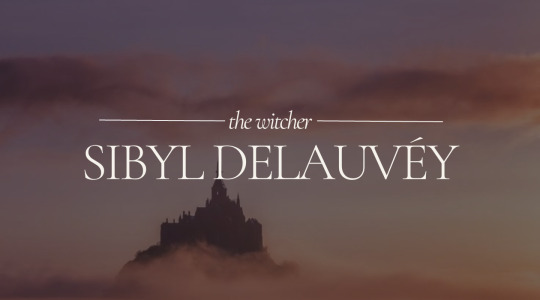
ANIMAL: gossamer-wing butterfly. black cat. white arabian horse.
COLORS: electric blue. ultraviolet. amaranthine.
MONTH: july.
SONGS: ephemera, gems | summit song, nicole dollanganger | wind in the caroberta woods, martin przybyłowicz.
NUMBER: zero.
PLANTS: weeping willow. bleeding hearts. wisteria. butterfly palms. rose trellises.
SMELLS: spilled wine. perfume. sweet black musk. vetiver.
GEMSTONE: larimar.
TIME OF DAY: late afternoon, early evening.
SEASON: belletyn.
PLACES: underwater. her fully furnished isolation tower, gripping the edge of her scrying pool. anna henrietta’s quarters. palaces. the toussaint countryside. mont saint michel. under a full moon.
FOOD: black currants. honey. prosciutto. goat cheese. seafood bisque. fresh fruit. risotto.
DRINKS: cherry cordial.
ELEMENT: air.
ASTROLOGICAL SIGNS: cancer. virgo.
SEASONINGS: star anise. pink pepper.
SKY: nothing like a toussaint sunset.
WEATHER: clear as crystal. breezy.
MAGICAL POWER: telepathy.
WEAPONS: these hands.
SOCIAL MEDIA: the find my friends feature on iphones.
MAKEUP PRODUCT: deep purple eyeliner.
CANDY: hard rock candy in the shape of gemstones. strawberry flavored.
METHOD OF LONG DISTANCE TRAVEL: portals. duh.
ART STYLE: baroque.
FEAR: being perceived.
MYTHOLOGICAL CREATURE: pegasus.
PIECE OF STATIONARY: letter via messenger pigeon
THREE EMOJIS: 🦋⚜️🔮
CELESTIAL BODY: the new moon.
22 notes
·
View notes
Text
"The immense mountains and precipices that overhung me on every side, the sound of the river raging among the rocks, and the dashing of the waterfalls around spoke of a power mighty as Omnipotence—and I ceased to fear or to bend before any being less almighty than that which had created and ruled the elements, here displayed in their most terrific guise. Still, as I ascended higher, the valley assumed a more magnificent and astonishing character. Ruined castles hanging on the precipices of piny mountains, the impetuous Arve, and cottages every here and there peeping forth from among the trees formed a scene of singular beauty. But it was augmented and rendered sublime by the mighty Alps, whose white and shining pyramids and domes towered above all, as belonging to another earth, the habitations of another race of beings.
[...] A tingling long-lost sense of pleasure often came across me during this journey. Some turn in the road, some new object suddenly perceived and recognized, reminded me of days gone by, and were associated with the lighthearted gaiety of boyhood. The very winds whispered in soothing accents, and maternal Nature bade me weep no more."
— Mary Shelley, Frankenstein (Volume II; 1831 version)
#Mary Shelley#nature#Switzerland#obsessed with the passages that capture the sublime during this reread#Romantic poetry & prose
23 notes
·
View notes
Text
5 songs, 3 outfits
My apologies, I cannot find the notif of who tag me in this a bit ago
but here i go.
Tagging below and with no pressure to play and apologies for any double tags. I've been seeing the game float around.
@thewanderer-000 @wrathfulrook @cassietrn @grimmylover7 @omen-speaker @carlosoliveiraa @simplegenius042 @strangefable
Rules: Post 5 songs associated with your OC(s), followed by 3 outfits they would wear.
Jenavieve Rose Seed(FC5 OC): 5 songs.
Rhiannon by Fleetwood Mac
She rings like a bell through the night
And wouldn't you love to love her?
She rules her life like a bird in flight
And who will be her lover?
All your life you've never seen
Woman taken by the wind
Setsugetsuka/紲月歌 by Yuzuki Yukari
夜の隙間に感じるのは ただ君の甘い温もりと
ただ二つの、鼓動――
What I feel inside the gap of night
are only your sweet warmth and two heartbeats--
Lost one's weeping/ロストワンの号哭 by Kagamine Rin/Neru
黒板のこの漢字が読めますか
あの子の心象は読めますか
その心を黒く染めたのは
おい誰なんだよ おい誰なんだよ
Can you read the kanji on the board?
Can you read the shape of her heart?
Who stained that heart black?
Who did it? Who did it!?
Unite! by Ayumi Hamasaki
自由を右手に 愛なら左手に
抱えて歩こう 時にはつまづきながら
Freedom in the right hand, love in the left
We'll walk on, embracing both, stumbling from time to time
I got you by Bebe Rexha
I just wanna love you, I got you
Don't have to be so guarded
Let's finish what we started
It's all I ever wanted
Oh wow this was intense now for the outfits Jenavieve would wear:



Ehhh I tried to get these to fit.
Phedra Nia Dawson(FC5 OC): 5 songs
Disgust me by New Year's Day
I wanna see all your scars
Show me who you really are
Don't fake it anymore
Let it out, let it out oh
Promise me you won't hold back
Oh, go on, disgust me
Tell me the ugly
I want something real
So on it by Miyavi
So wrong that I never go right
So one that I never think twice
So dead that I’m never gon’ die
Oops (Oh my!) by Tweet
Tell you what I did last night
I came home, say around a quarter to three
Still so high, hypnotized
In a trance, from his body
Joan of Arc by In This Moment
You can crucify
You can nail me to your cross (Light me up, light me up)
You can find me guilty for everything you've lost (Light me up, light me up)
Go ahead blame me for your sins
Go ahead and sacrifice me
Make me your martryr
I'll be your Joan of, I'll be your Joan of Arc
Oh Lord by In This Moment
Oh Lord please forgive me for what I'm about to do
Oh Lord won't you believe me I burn in hell for you
Oh Lord won't you teach me
Teach me how to see
Oh Lord tell me you love me
Am I Lillith or am I Eve
Oh God have mercy on me
Oh God have mercy on me
Hold me down under holy water
I fear I been laying with the devil
I been laying with the devil (save my soul)
Okay now the outfits that Phedra would wear.
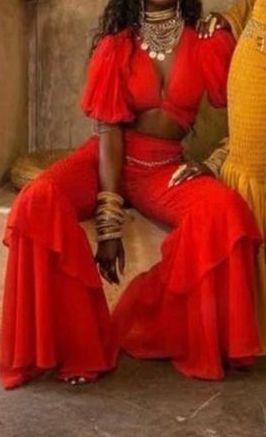

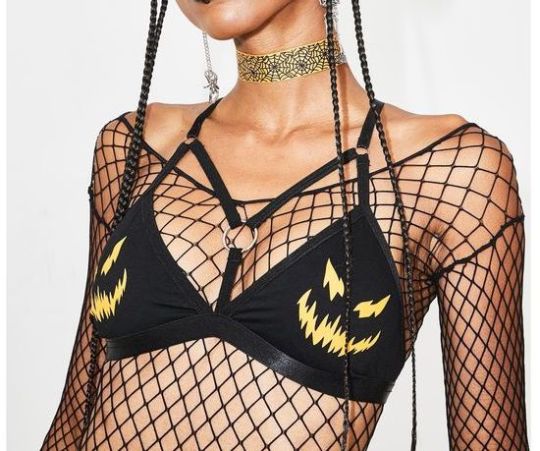
Ahyeee, okay umm here's some stuff. Thank you again. I guess if anybody gots question about stuff just ask. I'm not good at this stuff lol.
13 notes
·
View notes
Text
Memory of a SACRIFICE
Cronan slowly walked up to the stage, his hands shaking as unsheathed the sacrificial dagger in his robe's pocket. His fearful face hid behind a deep red mask with their cultist symbol etched into it so that he could see.
Looking out into the crowd, hundreds of people, young and old, stood in the gallows and steps of the colosseum-like stadium, and as Cronan looked back down, a banquet table stretched out in front of him.
It was lined with a beautiful white lace cloth, and on top was plate upon plate of different delicacies; steamed livers and grilled muscles and fried intestines, creating a gory and delicious scene of an Overlord's diet in front of him.
And, dead center, was his sister, lying with her feet and claws tied to the table, her fangs removed and her robes taken away in turn of fake, unsharp teeth and a lace white gown the exact color of the cloth beneath it.
Cronan could tell Celandine had trouble speaking by the way she moved her mouth to do so. The silent hums of the crowd almost covered up her pained whisper.
We need to get out of here. Please don't kill me. Please.
Cronan could feel his mother towering over him, right behind him, and his brother to his side, trying not to meet either of their eyes.
We were supposed to escape, Cronan. We were supposed to get out of here, and then I was chosen, and--...
His mother moved forward to give her sacred speech, one which used to give Cronan hope and joy and now only left him with bile bubbling in his throat.
We were supposed to go to the real world, or to whatever world we could find. Supposed to crawl our way out of these rings and find a new home. A home that wouldn't kill us for stupid reasons like an unholy god that barely speaks to us and probably barely exists.
The speech kept going on in the background. Everything other than Celandine's voice turned to an incessant droning of staticky white noise.
We can make it out of this somehow, Cronan. I don't have to die, y-you don't have to execute me-- we can run away together!! Cronan, Celandine, and Cerberin, everyone's favorite Overseer siblings? The heirs to the throne? The- the ones all of the peasants and guards and townspeople love? Loved?
His mother stepped back from her speech and went behind the table once more. Cronan stood silently. His hands shook, his legs shook, he couldn't bring himself to move, to speak, let alone sacrifice his own sister.
Please. Please. Please.
Cronan slowly raised the knife at a nod from his mother. He knew the drill by now from sacrificing random peasants and strangers.
No. No. Please.
He never thought they'd find Celandine's escape plans. He never thought this was how they would punish her.
Cronan. Cronan. Cronan.
He relished in her voice calling his name. Even if it was rocky and hoarse from fear, he'd never be able to hear that rocky, hoarse voice again after this.
Cronan, please, we can stop this. We can end this.
Gently, he placed the dagger on her heart and hummed their strange song, the nursery rhyme they were taught the moment they were born that stayed with them until it turned to a song only associated with a horrifying childhood.
Cronan...
Slowly, the whole stadium tuned into the song, an acapella of noise and joy, mixed with a handful of weeping children in the crowd, not used to seeing their food be hunted in front of them.
C...Cro...n..aann...
The dagger slowly, slowly dug through her skin, a wound that spread quickly as he tried to get it over with as fast as he could. Not wanting her to suffer like all of the rest gone to the winds of death.
And as he plunged the dagger in with her final cry echoing around the stadium, all he could hear was car alarms and bike bells and the rolling of rain in the stone streets, and he missed his home away from home in the suburbs of hell where he was able to be taken in by townspeople and play with the children of the streets, running around in robes that weren't adorned with blood.
He missed the feeling of waking up knowing that there'd be a new prank from Celandine or a poorly made trap by Cerberin hidden around their abode. He missed the feeling of doing chores knowing that the both of his siblings were there to complain with him. He missed the feeling of eating rarer foods brought in from the different rings of hell and spitting them out while laughing because they'd all never tasted anything worse in their lives.
But, with all of his memories and all of his thoughts, stirring around in his head like a tornado rampaging through his mind, over everything else, he missed the feeling of knowing that his sister was still alive.
#and then#camara awoke#in the body of a new woman#a woman whose sister was left far far far in the past#and all camara could do was cry and cry and cry.#vamp posts#memoryquest
4 notes
·
View notes
Text
snowdrops

Thou fairy gift from summer,
Why art thou blooming now?
The Snowdrop by Letitia Landon (L.E.L)
January in the Northern Hemisphere can be a hard time to celebrate a birthday. It's cold, winter still has a ways to go yet and everyone is pretty hung over from the rash of holidays that took up the past three months straight.
Enter the delicate and determined snowdrop.
Once upon a time, so the story goes in Germany, back when the world was new, Winter was sent out to find itself a color. Knowing how everyone raved about the beautiful colors of the Flowers, Winter went to them and asked if one of them would give him their color to wear. Prideful and protective of their own glory, the Flowers laughed at Winter and turned away from him. Only one didn't laugh. The snowdrop, small and dainty, offered to share its color with the Winter. In gratitude, Winter promised that the cold of its touch would never harm the little flower and it would be allowed to bloom during Winter's reign whenever the little flower liked.
The snowdrop, legend claims, can create its own warmth.
It is also one of the first flowers to bloom each year, often before the snow has even finished melting, its hard leaves able to push up through ice and frozen soil, popping up to carpet the forest floor in a very different white, filling the sharp winter air with its light fragrance. If you listen, the stories say, you can hear the faint sounds of their petal bells ringing, waking up the rest of the world to spring's arrival.
The plucky little snowdrop has been around for a very long time and they have a lot of stories that go with them.
In Romania and Moldova, snowdrops, sometimes called 'daughter of the wind', were the results of a hero's battle against Winter (or the Winter Witch). Winter had decided to prevent Spring, either by trapping the Sun or simply refusing to move on. The Sun's lover - or Lady Spring herself - fought with Winter and in each place their blood fell, snowdrops sprang up.
When Adam and Eve were chased from the Garden of Eden at the beginning of the world, Eve wept so bitterly that an angel took pity on her. He breathed onto a falling snowflake and everywhere the snow fell, snowdrops sprang up, to give the weeping woman hope and the promise of a better future.
Snowdrops were Persephone's tears when she was freed from Hades in Greek myth and their arrival heralded her return to her mother.
The flowers are sometimes called 'Candlemas bells' because Christian stories say that when Mary went to the Temple to be purified and to present Jesus there as her first-born on February 2, an angel gave her the gift of snowdrops.
Want another one?
In Homer's Odyssey, Sean Bean Odysseus is given a magical plant called 'moly' by Hermes. He uses this to resist Circe's poison. There's debate whether Homer's moly was truly meant to be a snowdrop - but at least as far back as Roman times, the snowdrop was believed to be an antidote against poison. In modern times, doctors are using it to help in the fight against Alzheimer's.
Don't get carried away with the home remedies just yet. Snowdrops can be toxic to pets and humans can suffer from imbibing too much as well.
Overall, given all the stories associated with snowdrops, it shouldn't surprise anyone that they are seen as symbols of hope and rebirth, or light in the darkness and triumph over tribulation. Their white color gives them a symbolism of purity. In the story of Snow White, her name is sometimes changed to Snowdrop. These little flowers give those worn down by the snow the promise of sunlight and brighter days to come.
Unless you were a Victorian. Because - of course. Snowdrops had a habit of growing in cemeteries and church yards and so Victorians viewed them as omens of illness at best and death at worst. Seeing a single snowdrop was bad. Bringing a single snowdrop inside your house was nothing short of inviting death in.
Luckily, that doesn't have to stop the rest of us from being delighted by these determined flowers and holding to the faith that, when the snowdrops arrive, better days are soon to come.
youtube
#snowdrops#birth flower#January#folklore#superstition#herbalism#cottagecore#january birth flower#birth month#birthday#I kept typing snowbells and I hope I caught them all#I'm very tired so forgive me if I didn't#you know what I meant#odysseus#homer#the odyssey#moly#Youtube
10 notes
·
View notes
Note
Dexy had decided to venture out of the room in pursuit of his hat. He'd accidentally left it outside when he was wandering about when everyone was gone, and it was the time of day where everyone should be gone, so... [the-weeping-wind-association]
Reiko trudges down the hall with a new cold pack. Evidently, Kurumi had caught a cold and couldn’t go to work today, and as her wife, Reiko had opted to stay behind from her own stuff in order to care for her-
-What is that??
@the-weeping-wind-association
17 notes
·
View notes
Text
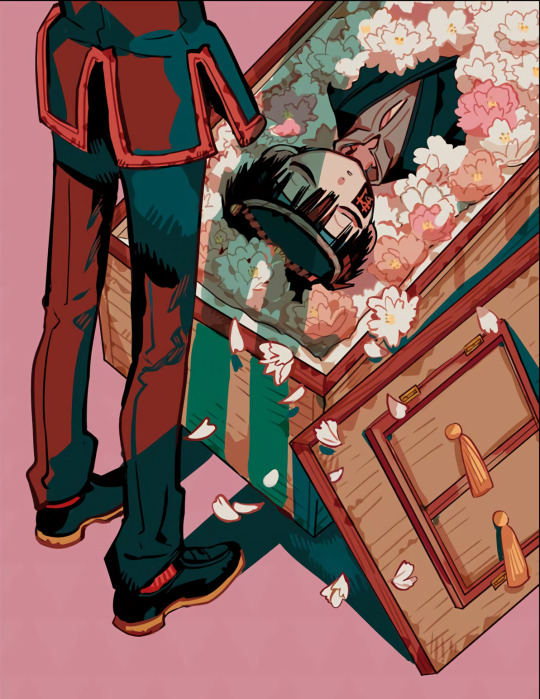
well its time for me to express my thoughts about all this. Sincerely!!
A tasteful choice to drop this image with the volume that confirms Tsukasa's Yorishiro status....
I love the petals falling out, as if Amane has just plucked off the lid, and in the cascade of wind, some feather-light blossoms are swept up... I love that the coffin has a little window to peek into.
We could imagine this as a purely symbolic image, but that's both no fun, and I do not think it is symbolic! I think it's our first glimpse into Amane's deepest boundary.... a glimpse we've finally earned after so much story.........
First off: this entire time one of my most pressing questions has been: why is Tsukasa dressed like this!!!
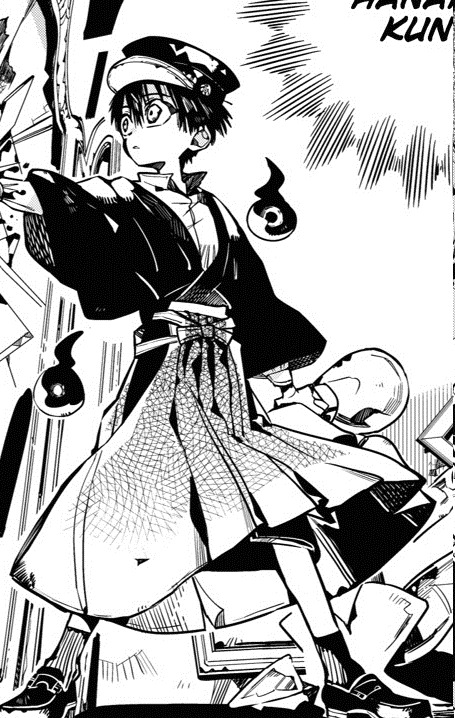
Tsukasa's outfit is very formal. As far as I understand, a hakama+kimono combination suchas this would only be worn to something like a rare formal event (wedding, funeral, ceremony of some sort…), or be worn by a priest working at a shrine.
Given that a Yorishiro is a sortof sacred shrine object, and a boundary is a mystery's personal shrine,
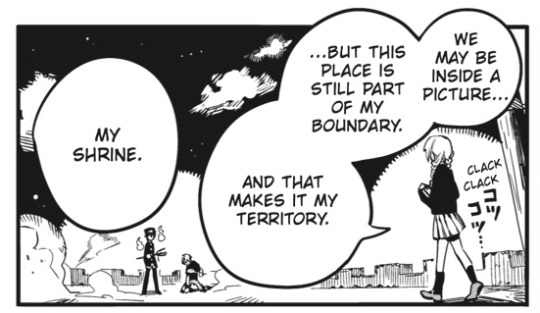
it was my vague 'best' assumption this whole time that Tsukasa's outfit was meant to evoke the sortof general holy, priestly vibes in particular. Simple, like, "well, maybe if a Yorishiro is a person, they naturally are in shrinely attire?" … only after seeing Hakubo/Sumire do we get an idea of how personal and intimately reflective a boundary truly is.
Hakubo's boundary represents his endless reflection over Sumire's final day. Hakubo feels an aimless, mysterious fixation, trying to understand what he 'wishes' had happened, what he 'wanted', what he wants for Sumire, what he felt, what he feels now. What he could have done for her, and why he wanted things to be different.
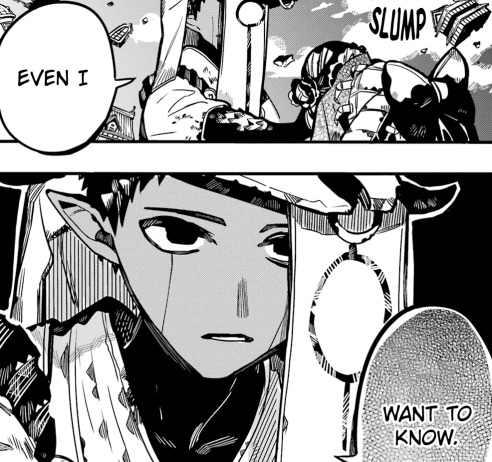
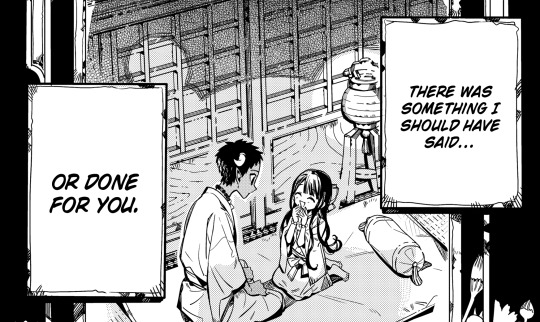
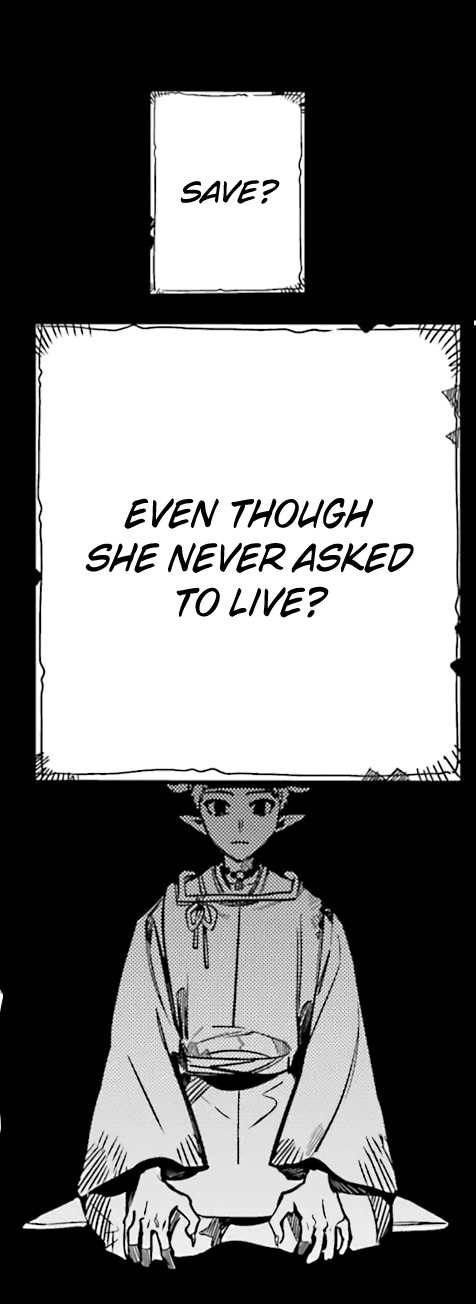
while I'm here did you know Hakubo only seems to use the 'boku' pronoun? This gives him a childish feeling.... at the least, it conveys his demeanor of deference.
Hakubo has never 'wanted' or 'wished' for anything, in his life; only doing as he was told. His boundary reflects his thoughts, which can't move further, which have no greater conclusion. An incomplete, perpetual loop, 'stuck'. Sumire faces her 'death' over and over and over in the deepest pits of his boundary. She cannot change the events. Only Hakubo can.
As Hakubo wanders alone with Sumire, the villagers disappear. As Hakubo addresses his memories, experiences quiet peace with Sumire, the boundary begins to weep around them.
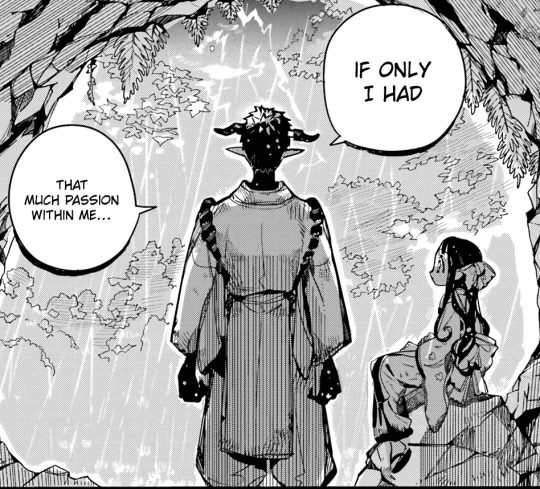
addressing his ultimate desire at the root of it all (a wish to not be an Oni; a wish to be human, to give Sumire what she wants, to fall in love with her, in a way he was convinced he could not do), it storms and thunders with his pain. It seems to evoke his feeling.
So....
what emotions does Amane have for Tsukasa, to adorn him in ceremonial attire, to shower him in cherry blossoms?
The sakura, as a briefly-blooming flower, is typically associated with fleeting, delicate, ephemeral beauty....
"it is in full bloom in a flash, and scatters in a flash. In the moment of its short life, the Japanese feel beauty." x
The sakura is also generally associated with feminine beauty in particular. Gracefulness...
Not surprising to see Tsukasa steeped in language addressing beauty. Tsukasa is often symbolized with the moon (and his name itself evokes the moon), obviously... something Amane is reverent about.
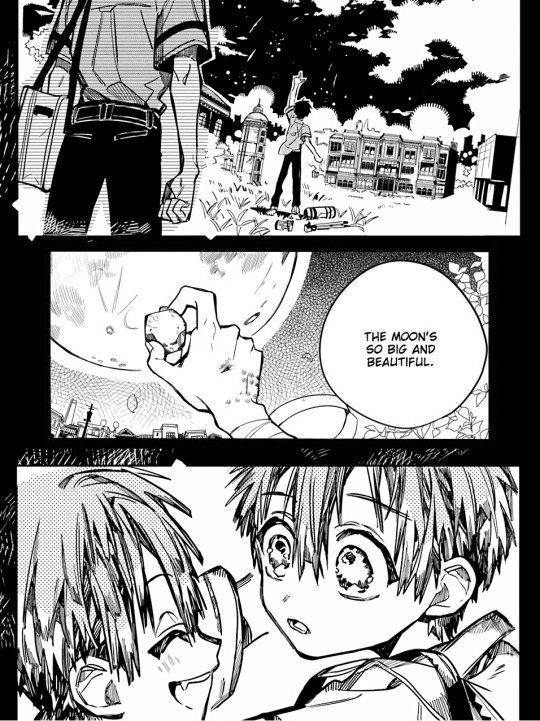
Actually, the sakura in the coffin are different from a typical sakura blossom. They are rather a specialty, fanciful variety that ruffle with many layers of petals.This multi-layered cherry blossom is called a yaezakura! I guess I would say it makes this feel like an unusually ornate, spectacular display.... as far as I understand, this sort of tree would be planted in particular locations deliberately, suchas beside a shrine.
Rested peacefully in a bed of yaezakura blossom, adorned in elegant solid hakama and black silk kimono, all convey a vision: something beautiful, something sacred, something delicate, something graceful, something short-lived, something cherished!
Tsukasa died in his school uniform stained in blood, stabbed in the chest, on wooden slat flooring. Amane died soon after, and their parents did, as well. Tsukasa did not get any sort of sacred ceremony or memorializing upon death.... so this is as far from a reflection of their final moments as one can get. It must be something more symbolic of Amane's feelings, than something reflective of any lived moment.

when you look at Tsukasa, do you think of sacred, ethereal, feminine, graceful beauty? The delicate petals of a Sakura blossom falling, in all its short-lived splendor?
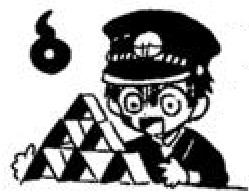
.... doesn't matter! Apparently... Amane feels something particular about Tsukasa which is expressed in these symbols.
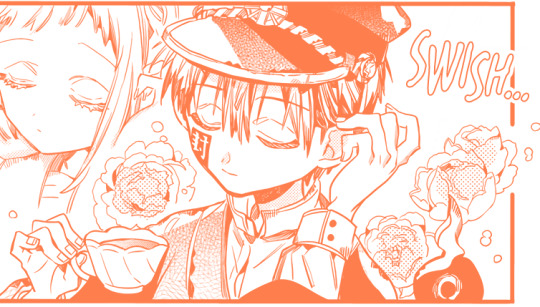
while we're thinking of flowers, the camellia is associated with 'modest beauty', as it lacks a fragrance... the camellia also simply drops its entire head upon death, while the cherry blossom sheds its petals beautifully.
I don't think we really have a complete vision of Tsukasa just yet....
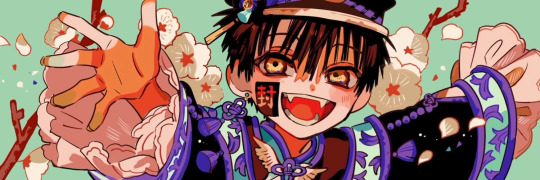
But beyond that ....
it's interesting that Tsukasa doesn't seem capable of moving. He appears to have been 'frozen' in Amane's boundary, peacefully secured inside of a coffin.
Amane desires to 'protect' Tsukasa...
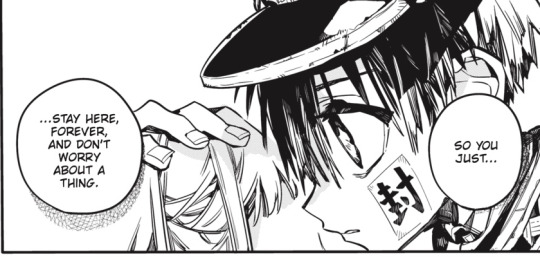
frozen in a peaceful sleep, motionless, for Amane to watch over and gaze at, forever.... hmm. It suits him... his desire for control.
To finally see Tsukasa's eyes staring back at him, feel Tsukasa's hand touching him....
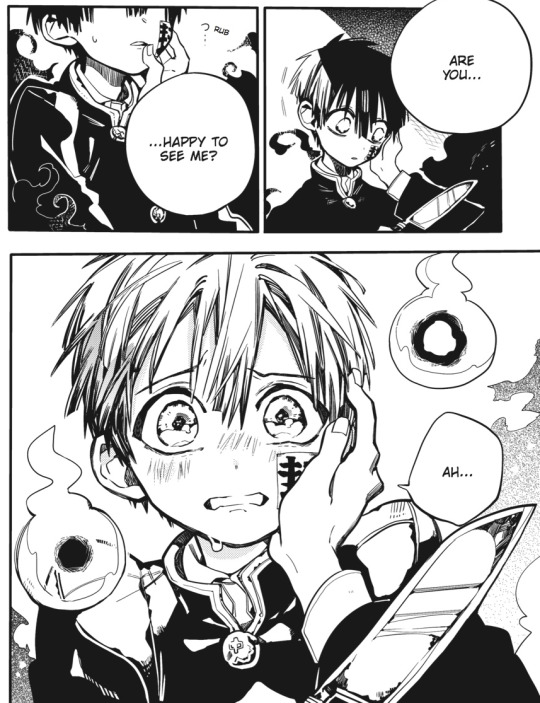
... after years of seeing this, frozen perfectly in his boundary.....

woof.
Well, it's exciting and, it's made me very emotional. Such veneration and respect and honor here... I get this feeling as if this is Amane's honest heart, something he cannot express audibly or physically, not to Nene and not to Tsukasa, too stubborn and reluctant to be vulnerable. Too afraid. Always talking in metaphors or avoiding saying anything directly... but, in his boundary, there is no obfuscation. Tsukasa was enshrined with all the luxurious adoration Amane had for his little brother, no matter what occurred between them in their final year. He deserved this, he was loved like this.
and I can't believe you might be responsible for his fucking titty window, Amane!

20 notes
·
View notes
Text
Tuatha de Dannon of the Celtic Pantheon

Celts were a nation of loosely confederated tribes who originated in central Europe and spread westward as far as Spain and the British Isles, the latter of which being the place where the Celtic legacy of language and culture best survives today. The pantheon of Celtic gods was made up of more than 400 different gods and goddesses representing all aspects of day-to-day life. Ancient Roman sources, early Christian writers, and stories that survived into medieval Irish mythology.
However, it's hard to know much about most of these gods, with many of them only surviving as single references in inscriptions.
THE DAGDA, CHIEF OF THE TUATHA DE DANANN
One of the chief gods of the Celtic pantheon was the Dagda, whose name means "the good god." As the World History Encyclopedia explains, this epithet likely refers to his wide variety of skills, which included being a talented craftsman, mighty warrior, powerful magician, and wise ruler. He owns cauldron that always had enough food in it to feed whatever party sat down by it; a tree that was never empty of fruit; a magic harp that can cause those hearing it to fall asleep, laugh, or weep; two magic pigs, one ever alive and one forever cooking; and a magic club so heavy it had to be carried on wheels, that could kill nine men with one blow and also raise the dead.
THE MORRIGAN, BLOODY GODDESS OF WAR
Her role as the representation of the bloodthirsty nature of war, and she is typically described in a manner befitting that role. Like war itself, the Morrigan is said to be both terrible and alluring, terrifying and tempting. She has a frightening aspect that she can use to inflict terror on her enemies during battle, but she is also supposed to be sexually provocative, as seen in her annual duties ringing in the new year by getting rutty with the Dagda. She can change shape at will, becoming a beautiful young woman, the wind, or a wide variety of animals or birds, though her most common shape is the crow, a carrion-eating bird that many northern Europeans associated with war and death.
LUGH OF THE LONG ARM
That said, using ancient Roman sources, early Christian writers, and stories that survived into medieval Irish mythology, we can get a pretty decent idea of who the key figures of the Celtic religion were. Here are some of the most important gods, goddesses, and heroes of the ancient Celts.
BRIGID, THE CELTIC ATHENA
Brigid was the daughter of the chief god, the Dagda, and her remit included crafts, prophecy, divination, and poetry. Her role as the patron of the art of metalwork and smithing led her to be associated with fire as well. As History points out, Brigid's powers of healing and wisdom.
DANU AND THE DIVINE MATRIARCHS
The unknown Mother Goddess
AENGUS, GOD OF YOUTH
The god of youth, love, and poetry. As Mythopedia explains, he was the son of the Dagda and the river goddess Boann.Aengus' role as god of poetry and inspiration gave him a way with words that often allowed him to get the better of his elders, and his position as the god of youth gave him some control over life and death, including the ability to resurrect the dead with the breath of life.
CERNUNNOS, THE HORNED GOD
Cernunnos, an antlered god whose name means, appropriately enough, "the Horned One."
CU CHULAINN, HOUND OF ULSTER
A mighty warrior and the son of the god Lugh. The name Cu Chulainn means "hound of Culann,"
He was known for his great strength, agility, and supernatural rage, as well as his magical spear that can inflict 30 wounds on a person with a single strike. Additionally, he was notable for being beardless and for having seven fingers on each hand, seven toes on each foot, and seven pupils in each eye.
MEDB, WARRIOR QUEEN OF CONNACHT
Medb was the daughter of Eochu Feidlech, the High King of Ireland, and she was beautiful, demanding, and fantastically strong. She had numerous suitors, lovers, and husbands, from whom she demanded that they never act afraid, mean, or jealous toward her, which might be a natural response from them as she was stronger, both mentally and physically, than any man who approached her. When she heard a prophecy that her hated first husband would be killed by someone named Maine, she changed the names of all of her sons to Maine, just to increase her chances of revenge.
EPONA, MOTHER OF HORSES
Epona was invoked and worshiped as the protectress of horses and other equine animals, such as mules and donkeys. Horses were extremely important to the Celtic way of life, especially among the Gallic cavalries,
BELENUS, THE SHINING ONE
There are about 31 surviving inscriptions to Belenus, which is an unusually high number for most Celtic deities. The locations of these inscriptions show that Belenus was worshiped in northern Italy, the eastern Alps, southern Gaul, and probably even up into Britain. He was a pastoral god associated with healing.
The May 1 festival of Beltane, was probably originally connected with the worship of Belenus. On Beltane, all the cattle would be purified by protective bonfires before being put out for pasture for the summer. The shining god Belenus would help oversee this.
Copied from: THE CELTIC PANTHEON OF GODS EXPLAINED/Internet Other Websites
35 notes
·
View notes
Text
Was looking at flower symbolism for Kiku. Because I love her. Her full name, Kikunojo, meaning Chrysanthemum Woman. And the name of the dance school she was born into, Hanayanagi, meaning Flower Willow, are both very good fits for her.
She gets both sun and moon symbolism, both being at the heart of the symbolism all throughout One Piece.
When chrysanthemums first began being cultivated in Japan, people noticed the flower’s petals would open in perfect order, leading the Japanese to begin associating the flower with perfection. Mums are symbolic of the sun as well.
With them being late blooming flowers, they represent joy and beauty despite the oncoming winter.
Many of these are quoted from websites I found. I especially love how clear it is that the author below really appreciates willows.
The strong association with the moon comes from the trees love for water. They are a symbol of fertility and new life.
Willow trees are resilient and flexible and can grow and thrive in difficult conditions. The branches are able to be contorted in ridiculous ways without showing signs of snapping.
The drooping vines of the weeping willow tree saunter in the wind, but don’t be mistaken, this tree is both powerful and iconic. Beneath the soil, the roots grow with fervor and remarkable strength.
The graceful weeping growth habit of the willow tree may look dainty but its power is not one to be underestimated. Its roots have been known to burst pipes.
https://tree2mydoor.com/pages/information-trees-celtic-tree-calendar-willow-tree-symbolism
https://bouqs.com/blog/chrysanthemum-meaning-and-symbolism/
11 notes
·
View notes